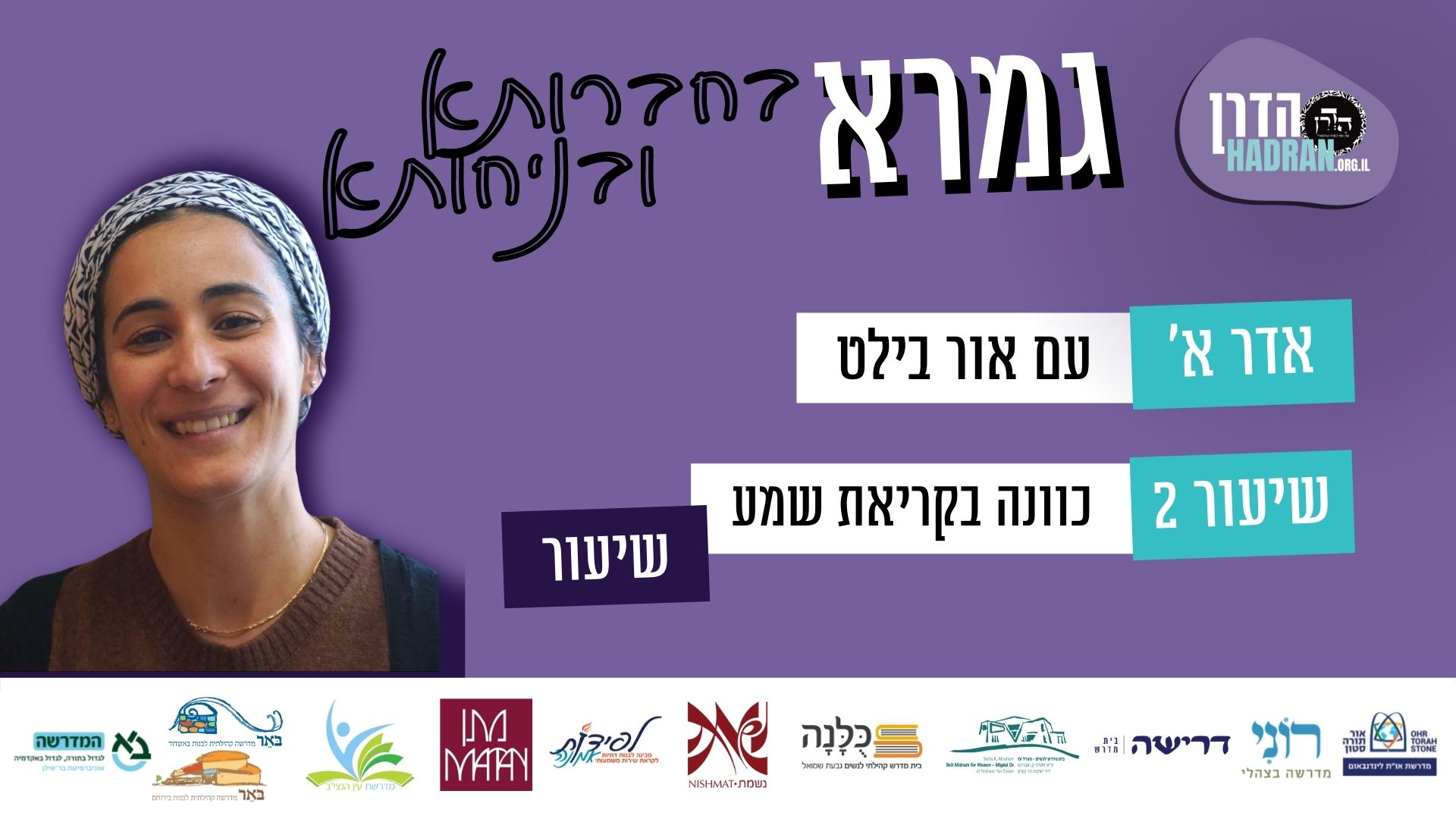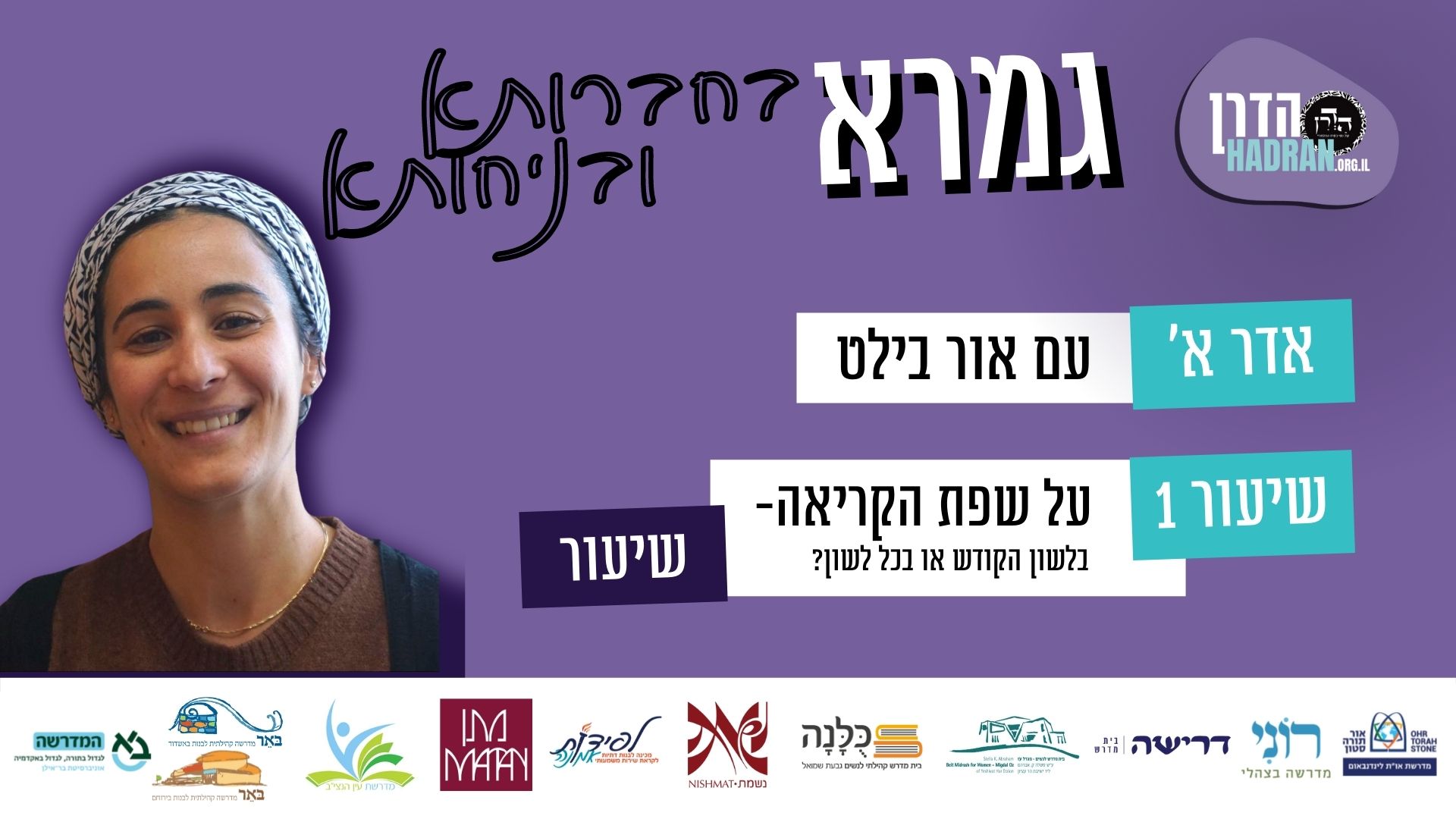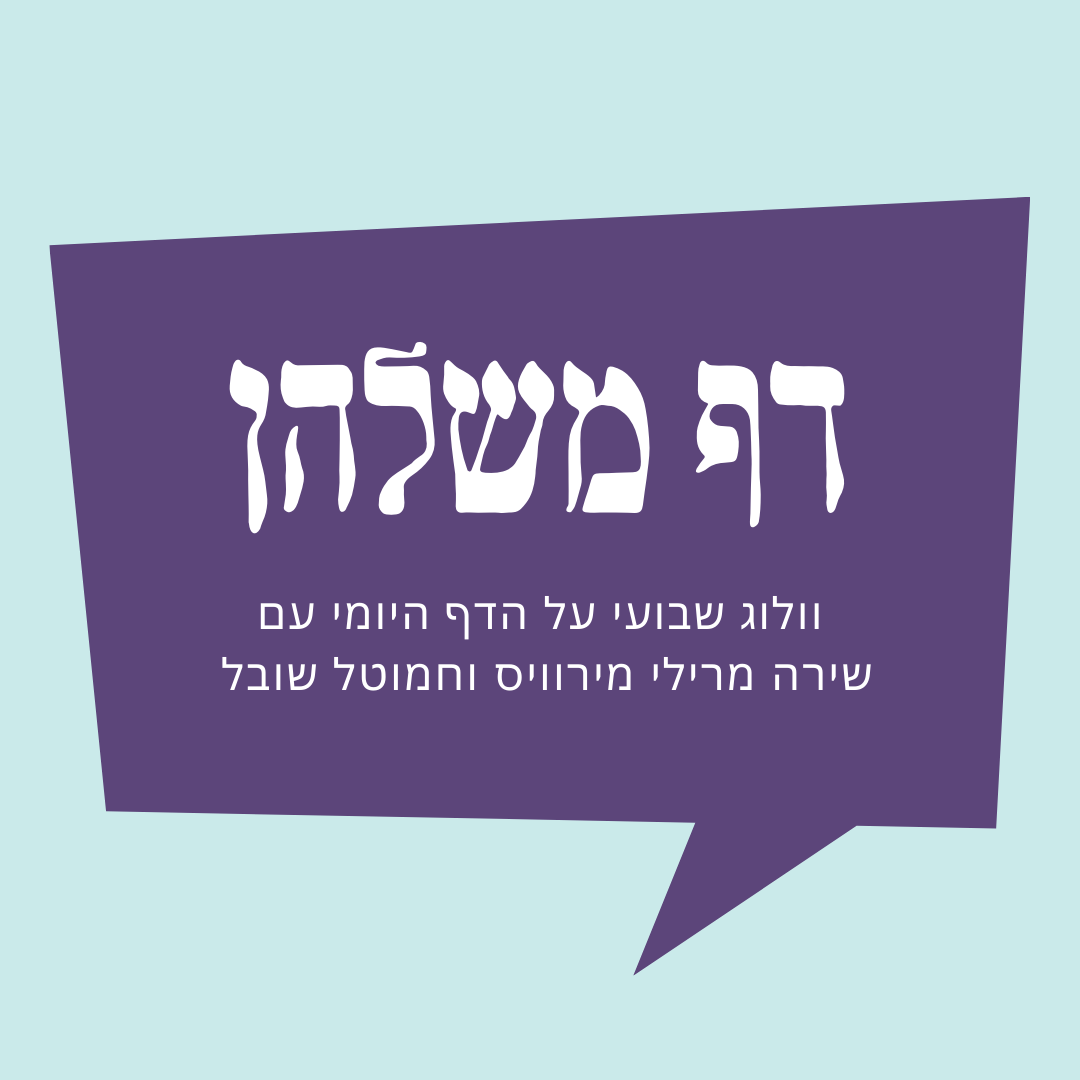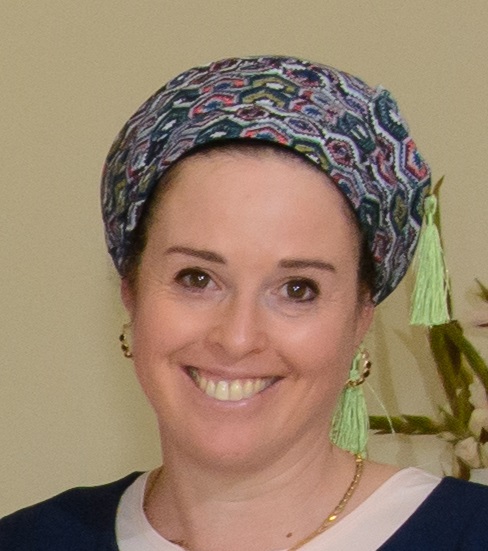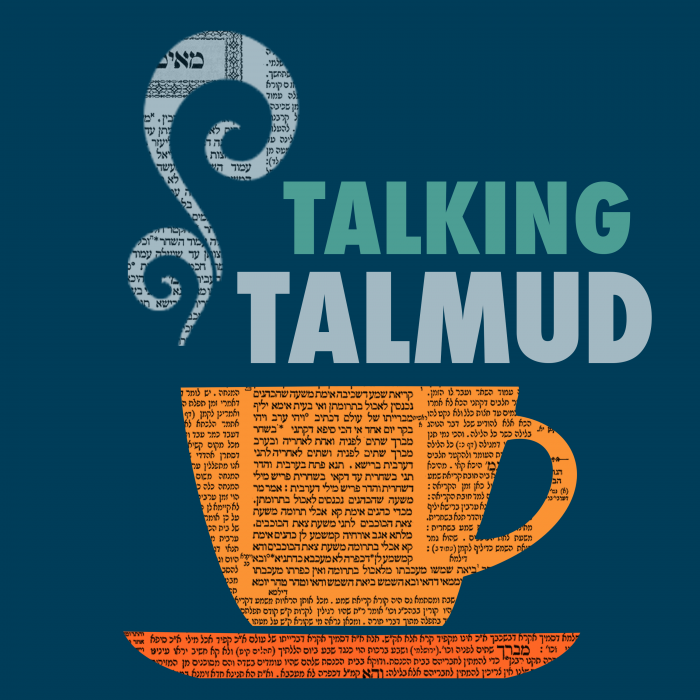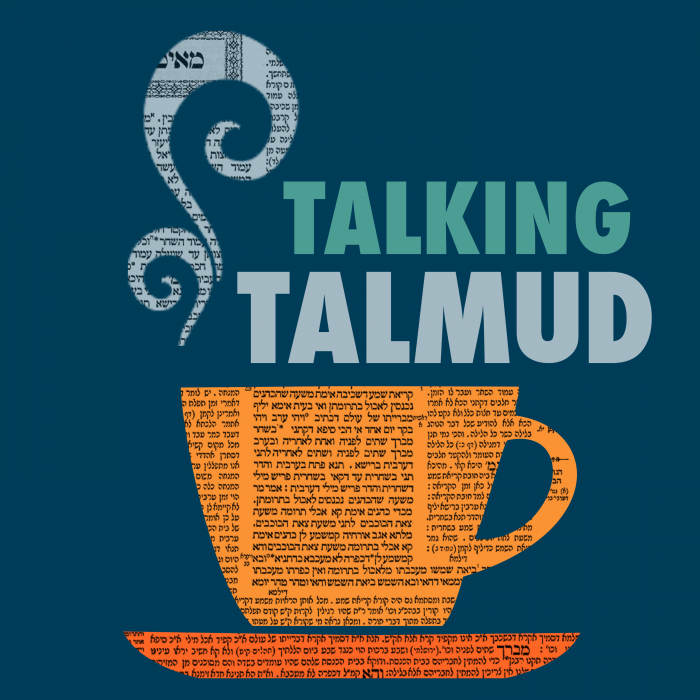הגמרא מונה כל מיני ברכות אחרות שאומרים אם לדוגמה רואים הרבה אנשים מישראל ביחד, חכם, מלך, אפילו חכם ומלך שהם אינם יהודים. הגמרא מספרת סיפור על רב ששת שהיה עיוור ובכל אופן ידי מתי הגיע המלך. יש ברכות גם למי שרואה בתי ישראל ובתי עובדי כוכבים בישובן, ובחרבנן, קברי ישראל ועובדי כוכבים, הרואה חבריו לאחר 30 יום, לאחר שנה, אנשים שנראים משונים, ובהמות שנראים משונים. מה זה זיקין שהזכירו במשנה?
רוצה להקדיש שיעור?
כלים
העמקה
רוצה להבין מה באמת קורה מתחת לפני השטח של הסוגיה?
שיעורים, פודקאסטים והרחבות של מיטב המורות שלנו יפתחו לך עוד זוויות וכיווני חשיבה.
חדשה בלימוד הגמרא?
זה הדף הראשון שלך? איזו התרגשות עצומה! יש לנו בדיוק את התכנים והכלים שיעזרו לך לעשות את הצעדים הראשונים ללמידה בקצב וברמה שלך, כך תוכלי להרגיש בנוח גם בתוך הסוגיות המורכבות ומאתגרות.
פסיפס הלומדות שלנו
גלי את קהילת הלומדות שלנו, מגוון נשים, רקעים וסיפורים. כולן חלק מתנועה ומסע מרגש ועוצמתי.
ברכות נח
אָמַר רַבִּי יִרְמְיָה בֶּן אֶלְעָזָר: נִתְקַלְּלָה בָּבֶל — נִתְקַלְּלוּ שְׁכֵנֶיהָ. נִתְקַלְּלָה שׁוֹמְרוֹן — נִתְבָּרְכוּ שְׁכֵנֶיהָ: נִתְקַלְּלָה בָּבֶל — נִתְקַלְּלוּ שְׁכֵנֶיהָ, דִּכְתִיב: ״וְשַׂמְתִּיהָ לְמוֹרַשׁ קִפֹּד וְאַגְמֵי מָיִם״. נִתְקַלְּלָה שׁוֹמְרוֹן נִתְבָּרְכוּ שְׁכֵנֶיהָ — דִּכְתִיב: ״וְשַׂמְתִּי שֹׁמְרוֹן לְעִי הַשָּׂדֶה לְמַטָּעֵי כָרֶם וְגוֹ׳״.
With regard to Babylonia, the Gemara cites what Rabbi Yirmeya ben Elazar said: When Babylonia was cursed, its neighbors were cursed along with it. When Samaria was cursed, its neighbors were blessed. When Babylonia was cursed its neighbors were cursed along with it, as it is written: “I will also make it a possession for the bittern, a wading bird, and pools of water” (Isaiah 14:23); not only will it be destroyed, but the site will become a habitat for destructive, environmentally harmful creatures. When Samaria was cursed, however, its neighbors were blessed, as it is written: “Therefore I will make Samaria a heap in the field, a place for the planting of vineyards” (Micah 1:6); although destroyed, it will serve a beneficial purpose.
וְאָמַר רַב הַמְנוּנָא: הָרוֹאֶה אוּכְלוּסֵי יִשְׂרָאֵל, אוֹמֵר: ״בָּרוּךְ … חֲכַם הָרָזִים״. אוּכְלוּסֵי גּוֹיִם, אוֹמֵר: ״בּוֹשָׁה אִמְּכֶם וְגוֹ׳״.
And Rav Hamnuna said: One who sees multitudes of Israel, six hundred thousand Jews, recites: Blessed…Who knows all secrets. One who sees multitudes of gentiles recites: “Your mother shall be sore ashamed, she that bore you shall be confounded; behold, the hindermost of the nations shall be a wilderness, a dry land, and a desert” (Jeremiah 50:12).
תָּנוּ רַבָּנַן: הָרוֹאֶה אוּכְלוּסֵי יִשְׂרָאֵל, אוֹמֵר: ״בָּרוּךְ … חֲכַם הָרָזִים״ — שֶׁאֵין דַּעְתָּם דּוֹמָה זֶה לָזֶה, וְאֵין פַּרְצוּפֵיהֶן דּוֹמִים זֶה לָזֶה. בֶּן זוֹמָא רָאָה אוּכְלוּסָא עַל גַּב מַעֲלָה בְּהַר הַבַּיִת, אָמַר: ״בָּרוּךְ … חֲכַם הָרָזִים וּבָרוּךְ … שֶׁבָּרָא כׇּל אֵלּוּ לְשַׁמְּשֵׁנִי״.
The Sages taught in a Tosefta: One who sees multitudes of Israel recites: Blessed…Who knows all secrets. Why is this? He sees a whole nation whose minds are unlike each other and whose faces are unlike each other, and He Who knows all secrets, God, knows what is in each of their hearts. The Gemara relates: Ben Zoma once saw a multitude [okhlosa] of Israel while standing on a stair on the Temple Mount. He immediately recited: Blessed…Who knows all secrets and Blessed…Who created all these to serve me.
הוּא הָיָה אוֹמֵר: כַּמָּה יְגִיעוֹת יָגַע אָדָם הָרִאשׁוֹן עַד שֶׁמָּצָא פַּת לֶאֱכוֹל: חָרַשׁ, וְזָרַע, וְקָצַר, וְעִמֵּר, וְדָשׁ, וְזָרָה, וּבָרַר, וְטָחַן, וְהִרְקִיד, וְלָשׁ, וְאָפָה, וְאַחַר כָּךְ אָכַל. וַאֲנִי מַשְׁכִּים וּמוֹצֵא כׇּל אֵלּוּ מְתוּקָּנִין לְפָנַי. וְכַמָּה יְגִיעוֹת יָגַע אָדָם הָרִאשׁוֹן עַד שֶׁמָּצָא בֶּגֶד לִלְבּוֹשׁ: גָּזַז, וְלִבֵּן, וְנִפֵּץ, וְטָוָה, וְאָרַג, וְאַחַר כָּךְ מָצָא בֶּגֶד לִלְבּוֹשׁ, וַאֲנִי מַשְׁכִּים וּמוֹצֵא כׇּל אֵלֶּה מְתוּקָּנִים לְפָנַי. כׇּל אוּמּוֹת שׁוֹקְדוֹת וּבָאוֹת לְפֶתַח בֵּיתִי, וַאֲנִי מַשְׁכִּים וּמוֹצֵא כׇּל אֵלּוּ לְפָנַי.
Explaining his custom, he would say: How much effort did Adam the first man exert before he found bread to eat: He plowed, sowed, reaped, sheaved, threshed, winnowed in the wind, separated the grain from the chaff, ground the grain into flour, sifted, kneaded, and baked and only thereafter he ate. And I, on the other hand, wake up and find all of these prepared for me. Human society employs a division of labor, and each individual benefits from the service of the entire world. Similarly, how much effort did Adam the first man exert before he found a garment to wear? He sheared, laundered, combed, spun and wove, and only thereafter he found a garment to wear. And I, on the other hand, wake up and find all of these prepared for me. Members of all nations, merchants and craftsmen, diligently come to the entrance of my home, and I wake up and find all of these before me.
הוּא הָיָה אוֹמֵר: אוֹרֵחַ טוֹב מַהוּ אוֹמֵר? — כַּמָּה טְרָחוֹת טָרַח בַּעַל הַבַּיִת בִּשְׁבִילִי, כַּמָּה בָּשָׂר הֵבִיא לְפָנַי, כַּמָּה יַיִן הֵבִיא לְפָנַי, כַּמָּה גְּלוּסְקָאוֹת הֵבִיא לְפָנַי, וְכׇל מַה שֶּׁטָּרַח — לֹא טָרַח אֶלָּא בִּשְׁבִילִי. אֲבָל אוֹרֵחַ רַע מַהוּ אוֹמֵר? — מַה טּוֹרַח טָרַח בַּעַל הַבַּיִת זֶה? פַּת אַחַת אָכַלְתִּי, חֲתִיכָה אַחַת אָכַלְתִּי, כּוֹס אֶחָד שָׁתִיתִי, כׇּל טוֹרַח שֶׁטָּרַח בַּעַל הַבַּיִת זֶה — לֹא טָרַח אֶלָּא בִּשְׁבִיל אִשְׁתּוֹ וּבָנָיו.
Ben Zoma would say: A good guest, what does he say? How much effort did the host expend on my behalf, how much meat did the host bring before me. How much wine did he bring before me. How many loaves [geluskaot] did he bring before me. All the effort that he expended, he expended only for me. However, a bad guest, what does he say? What effort did the host expend? I ate only one piece of bread, I ate only one piece of meat and I drank only one cup of wine. All the effort that the home owner expended he only expended on behalf of his wife and children.
עַל אוֹרֵחַ טוֹב מַהוּ אוֹמֵר? — ״זְכֹר כִּי תַשְׂגִּיא פׇעֳלוֹ אֲשֶׁר שֹׁרְרוּ אֲנָשִׁים״. עַל אוֹרֵחַ רַע כְּתִיב: ״לָכֵן יְרֵאוּהוּ אֲנָשִׁים וְגוֹ׳״.
With regard to a good guest, what does he say? “Remember that you magnify his work, whereof men have sung” (Job 36:24); he praises and acknowledges those who helped him. With regard to a bad guest it is written: “Men do therefore fear him; he regards not any who are wise of heart” (Job 37:24).
״וְהָאִישׁ בִּימֵי שָׁאוּל זָקֵן בָּא בַאֲנָשִׁים״. אָמַר רָבָא, וְאִיתֵּימָא רַב זְבִיד, וְאִיתֵּימָא רַב אוֹשַׁעְיָא: זֶה יִשַׁי אֲבִי דָּוִד שֶׁיָּצָא בְּאוּכְלוּסָא, וְנִכְנַס בְּאוּכְלוּסָא, וְדָרַשׁ בְּאוּכְלוּסָא. אָמַר עוּלָּא: נְקִיטִינַן אֵין אוּכְלוּסָא בְּבָבֶל. תָּנָא: אֵין אוּכְלוּסָא פְּחוּתָה מִשִּׁשִּׁים רִבּוֹא.
On the topic of multitudes, the Gemara cites another verse: “And the man in the days of Saul was old, and came among men” (I Samuel 17:12). Rava, and some say Rav Zevid, and some say Rav Oshaya, said: This refers to Yishai, father of David, who always went out with multitudes, and entered with multitudes, and taught Torah with multitudes. Ulla said: We hold there is no multitude in Babylonia. The Sage taught: A multitude is no fewer than six hundred thousand people.
תָּנוּ רַבָּנַן: הָרוֹאֶה חַכְמֵי יִשְׂרָאֵל, אוֹמֵר ״בָּרוּךְ … שֶׁחָלַק מֵחׇכְמָתוֹ לִירֵאָיו״. חַכְמֵי אוּמּוֹת הָעוֹלָם, אוֹמֵר: ״בָּרוּךְ … שֶׁנָּתַן מֵחׇכְמָתוֹ לְבָשָׂר וָדָם״. הָרוֹאֶה מַלְכֵי יִשְׂרָאֵל, אוֹמֵר: ״בָּרוּךְ … שֶׁחָלַק מִכְּבוֹדוֹ לִירֵאָיו״. מַלְכֵי אוּמּוֹת הָעוֹלָם, אוֹמֵר: ״בָּרוּךְ … שֶׁנָּתַן מִכְּבוֹדוֹ לְבָשָׂר וָדָם״.
The Sages taught: One who sees the Sages of Israel recites: Blessed…Who has shared of His wisdom with those who revere Him. One who sees Sages of the nations of the world recites: Blessed…Who has given of His wisdom to flesh and blood. One who sees kings of Israel recites: Blessed…Who has shared of His glory with those who revere Him. One who sees kings of the other nations of the world recites: Blessed…Who has given of His glory to flesh and blood.
אָמַר רַבִּי יוֹחָנָן: לְעוֹלָם יִשְׁתַּדֵּל אָדָם לָרוּץ לִקְרַאת מַלְכֵי יִשְׂרָאֵל. וְלֹא לִקְרַאת מַלְכֵי יִשְׂרָאֵל בִּלְבַד, אֶלָּא אֲפִילּוּ לִקְרַאת מַלְכֵי אוּמּוֹת הָעוֹלָם, שֶׁאִם יִזְכֶּה — יַבְחִין בֵּין מַלְכֵי יִשְׂרָאֵל לְמַלְכֵי אוּמּוֹת הָעוֹלָם.
Rabbi Yoḥanan said: One should always strive to run toward kings of Israel to greet them. And not only should he run toward kings of Israel, but also toward kings of the nations of the world, so that if he will be privileged to witnesses the glory of the Messiah (Rashi) and the World-to-Come, he will distinguish between the kings of Israel and the kings of the nations of the world.
רַב שֵׁשֶׁת סַגִּי נְהוֹר הֲוָה. הֲווֹ קָאָזְלִי כּוּלֵּי עָלְמָא לְקַבּוֹלֵי אַפֵּי מַלְכָּא, וְקָם אֲזַל בַּהֲדַיְיהוּ רַב שֵׁשֶׁת. אַשְׁכְּחֵיהּ הָהוּא מִינָא, אֲמַר לֵיהּ: חַצְבֵי לְנַהְרָא, כַּגְנֵי לְיָיא? אֲמַר לֵיהּ: תָּא חֲזִי דְּיָדַעְנָא טְפֵי מִינָּךְ. חֲלַף גּוּנְדָּא קַמַּיְיתָא. כִּי קָא אָוְושָׁא, אֲמַר לֵיהּ הָהוּא מִינָא: אֲתָא מַלְכָּא. אֲמַר לֵיהּ רַב שֵׁשֶׁת: לָא קָאָתֵי. חֲלַף גּוּנְדָּא תִּנְיָינָא. כִּי קָא אָוְושָׁא, אֲמַר לֵיהּ הָהוּא מִינָא: הַשְׁתָּא קָא אָתֵי מַלְכָּא. אֲמַר לֵיהּ רַב שֵׁשֶׁת: לָא קָא אָתֵי מַלְכָּא. חָלֵיף תְּלִיתַאי. כִּי קָא שָׁתְקָא, אֲמַר לֵיהּ רַב שֵׁשֶׁת: וַדַּאי הַשְׁתָּא אָתֵי מַלְכָּא.
The Gemara relates: Rav Sheshet was blind. Everyone was going to greet the king and Rav Sheshet stood up and went along with them. This heretic found him there and said to him: The intact jugs go to the river, where do the broken jugs go? Why is a blind person going to see the king? Rav Sheshet said to him: Come see that I know more than you do. The first troop passed, and when the noise grew louder, this heretic said to him: The king is coming. Rav Sheshet said to him: The king is not coming. The second troop passed, and when the noise grew louder, this heretic said to him: Now the king is coming. Rav Sheshet said to him: The king is not coming. The third troop passed, and when there was silence, Rav Sheshet said to him: Certainly now the king is coming.
אֲמַר לֵיהּ הָהוּא מִינָא: מְנָא לָךְ הָא? אֲמַר לֵיהּ: דְּמַלְכוּתָא דְאַרְעָא כְּעֵין מַלְכוּתָא דִרְקִיעָא, דִּכְתִיב: ״צֵא וְעָמַדְתָּ בָהָר לִפְנֵי ה׳ וְהִנֵּה ה׳ עֹבֵר וְרוּחַ גְּדוֹלָה וְחָזָק מְפָרֵק הָרִים וּמְשַׁבֵּר סְלָעִים לִפְנֵי ה׳ לֹא בָרוּחַ ה׳ וְאַחַר הָרוּחַ רַעַשׁ לֹא בָרַעַשׁ ה׳. וְאַחַר הָרַעַשׁ אֵשׁ לֹא בָאֵשׁ ה׳ וְאַחַר הָאֵשׁ קוֹל דְּמָמָה דַקָּה״.
This heretic said to him: How do you know this? Rav Sheshet said to him: Royalty on earth is like royalty in the heavens, as it is written with regard to God’s revelation to Elijah the Prophet on Mount Horeb:
“And He said: Go forth, and stand upon the mount before the Lord.
And, behold, the Lord passed by, and a great and strong wind rent the mountains, and broke in pieces the rocks before the Lord;
but the Lord was not in the wind;
and after the wind an earthquake;
but the Lord was not in the earthquake;
and after the earthquake a fire;
but the Lord was not in the fire;
and after the fire a still small voice.
And it was so, when Elijah heard it, that he wrapped his face in his mantle and went out, and stood in the entrance of the cave” (I Kings 19:11–13). God’s revelation was specifically at the moment of silence.
כִּי אֲתָא מַלְכָּא, פָּתַח רַב שֵׁשֶׁת וְקָא מְבָרֵךְ לֵיהּ. אֲמַר לֵיהּ הָהוּא מִינָא: לְמַאן דְּלָא חָזֵית לֵיהּ קָא מְבָרְכַתְּ? וּמַאי הֲוִי עֲלֵיהּ דְּהָהוּא מִינָא? אִיכָּא דְּאָמְרִי: חַבְרוֹהִי כַּחְלִינְהוּ לְעֵינֵיהּ, וְאִיכָּא דְּאָמְרִי: רַב שֵׁשֶׁת נָתַן עֵינָיו בּוֹ, וְנַעֲשָׂה גַּל שֶׁל עֲצָמוֹת.
When the king came, Rav Sheshet began to bless him. The heretic mockingly said to him: Do you bless someone you do not see? The Gemara asks: And what ultimately happened to this heretic? Some say that his friends gouged out his eyes, and some say that Rav Sheshet fixed his gaze upon him, and the heretic became a pile of bones.
רַבִּי שֵׁילָא נַגְּדֵיהּ לְהָהוּא גַּבְרָא דִּבְעַל גּוֹיָה. אֲזַל אֲכַל בֵּיהּ קוּרְצֵי בֵּי מַלְכָּא, אֲמַר: אִיכָּא חַד גַּבְרָא בִּיהוּדָאֵי דְּקָא דָּיֵין דִּינָא בְּלָא הַרְמָנָא דְמַלְכָּא. שַׁדַּר עֲלֵיהּ פְּרִיסְתְּקָא. כִּי אֲתָא אָמְרִי לֵיהּ: מַאי טַעְמָא נַגֵּדְתֵּיהּ לְהַאי? אֲמַר לְהוּ: דְּבָא עַל חֲמָרְתָא. אָמְרִי לֵיהּ: אִית לְךָ סָהֲדִי? אֲמַר לְהוּ: אִין. אֲתָא אֵלִיָּהוּ אִדְּמִי לֵיהּ כְּאִינִישׁ, וְאַסְהֵיד. אָמְרִי לֵיהּ: אִי הָכִי, בַּר קְטָלָא הוּא! אֲמַר לְהוּ: אֲנַן מִיּוֹמָא דִּגְלֵינַן מֵאַרְעִין לֵית לַן רְשׁוּתָא לְמִקְטַל. אַתּוּן, מַאי דְּבָעֵיתוּן עֲבִידוּ בֵּיהּ.
As for the connection between divine and earthly royalty, the Gemara cites another story: Rabbi Sheila ordered that a man who had relations with a gentile woman be flogged. That man went to inform the king and said: There is one man among the Jews who renders judgment without the king’s authority [harmana]. The king sent a messenger [peristaka] for Rabbi Sheila to bring him to trial. When Rabbi Sheila came, they said to him: Why did you order flogging for this man? He said to them: Because he had relations with a female donkey. According to Persian law this was an extremely heinous crime, so they said to him: Do you have witnesses that he did so? He replied: Yes, and Elijah the prophet came and appeared as a person and testified. They said to Rabbi Sheila: If so, he is liable for the death penalty; why did you not sentence him to death? He replied: Since the day we were exiled from our land we do not have the authority to execute, but you, do with him as you wish.
עַד דִּמְעַיְּינִי בֵּיהּ בְּדִינָא, פְּתַח רַבִּי שֵׁילָא וַאֲמַר: ״לְךָ ה׳ הַגְּדֻלָּה וְהַגְּבוּרָה וְגוֹ׳״. אָמְרִי לֵיהּ: מַאי קָאָמְרַתְּ? אֲמַר לְהוּ, הָכִי קָאָמֵינָא: ״בְּרִיךְ רַחֲמָנָא דְּיָהֵיב מַלְכוּתָא בְּאַרְעָא כְּעֵין מַלְכוּתָא דִרְקִיעָא, וִיהַב לְכוּ שׁוּלְטָנָא וְרָחֲמִי דִּינָא״. אֲמַרוּ: חַבִּיבָא עֲלֵיהּ יְקָרָא דְמַלְכוּתָא כּוּלֵּי הַאי! יָהֲבִי לֵיהּ קוּלְפָא אֲמַרוּ לֵיהּ: דּוּן דִּינָא.
As they considered the sentence, Rabbi Sheila praised God for saving him from danger: “Yours, O Lord, is the greatness, power, glory, triumph, and majesty; for all that is in heaven and on earth is Yours; Yours is the kingdom, O Lord, and You are exalted as head above all” (I Chronicles 29:11). They asked him: What did you say? He told them: This is what I said: Blessed is Merciful One who grants kingdom on earth that is a microcosm of the kingdom in heaven, and granted you dominion and love of justice. They said to him: Indeed, the honor of royalty is so dear to you. They gave him a staff to symbolize his license to sit in judgment and said to him: Judge.
כִּי הֲוָה נָפֵיק, אֲמַר לֵיהּ הַהוּא גַּבְרָא: עָבֵיד רַחֲמָנָא נִיסָּא לְשַׁקָּרֵי הָכִי? אֲמַר לֵיהּ: רָשָׁע, לָאו חֲמָרֵי אִיקְּרוּ? דִּכְתִיב: ״אֲשֶׁר בְּשַׂר חֲמוֹרִים בְּשָׂרָם״. חַזְיֵיהּ דְּקָאָזֵיל לְמֵימְרָא לְהוּ דִּקְרִינְהוּ חֲמָרֵי, אֲמַר: הַאי רוֹדֵף הוּא. וְהַתּוֹרָה אָמְרָה: אִם בָּא לְהׇרְגְּךָ — הַשְׁכֵּם לְהׇרְגוֹ. מַחְיֵיהּ בְּקוּלְפָא וְקַטְלֵיהּ.
As he was leaving, that man said to Rabbi Sheila: Does God perform such miracles for liars? He replied: Scoundrel! Aren’t gentiles called donkeys? As it is written: “Whose flesh is as the flesh of donkeys” (Ezekiel 23:20). Rabbi Sheila saw that he was going to tell the Persian authorities that he called them donkeys. He said: This man has the legal status of a pursuer. He seeks to have me killed. And the Torah said: If one comes to kill you, kill him first. He struck him with the staff and killed him.
אֲמַר: הוֹאִיל וְאִתְעֲבִיד לִי נִיסָּא בְּהַאי קְרָא, דָּרֵישְׁנָא לֵיהּ: ״לְךָ ה׳ הַגְּדֻלָּה״ — זוֹ מַעֲשֵׂה בְרֵאשִׁית, וְכֵן הוּא אוֹמֵר: ״עֹשֶׂה גְדֹלוֹת עַד אֵין חֵקֶר״. ״וְהַגְּבוּרָה״ — זוֹ יְצִיאַת מִצְרַיִם, שֶׁנֶּאֱמַר: ״וַיַּרְא יִשְׂרָאֵל אֶת הַיָּד הַגְּדֹלָה וְגוֹ׳״. ״וְהַתִּפְאֶרֶת״ — זוֹ חַמָּה וּלְבָנָה שֶׁעָמְדוּ לוֹ לִיהוֹשֻׁעַ, שֶׁנֶּאֱמַר: ״וַיִּדֹּם הַשֶּׁמֶשׁ וְיָרֵחַ עָמָד וְגוֹ׳״. ״וְהַנֵּצַח״ — זוֹ מַפַּלְתָּהּ שֶׁל רוֹמִי. וְכֵן הוּא אוֹמֵר: ״וְיֵז נִצְחָם עַל בְּגָדַי וְגוֹ׳״. ״וְהַהוֹד״ — זוֹ מִלְחֶמֶת נַחֲלֵי אַרְנוֹן, שֶׁנֶּאֱמַר: ״עַל כֵּן יֵאָמַר בְּסֵפֶר מִלְחֲמֹת ה׳ אֶת וָהֵב בְּסוּפָה וְגוֹ׳״. ״כִּי כֹל בַּשָּׁמַיִם וּבָאָרֶץ״ — זוֹ מִלְחֶמֶת סִיסְרָא, שֶׁנֶּאֱמַר: ״מִן שָׁמַיִם נִלְחָמוּ הַכּוֹכָבִים מִמְּסִלּוֹתָם וְגוֹ׳״. ״לְךָ ה׳ הַמַּמְלָכָה״ — זוֹ מִלְחֶמֶת עֲמָלֵק, וְכֵן הוּא אוֹמֵר: ״כִּי יָד עַל כֵּס יָהּ״. ״וְהַמִּתְנַשֵּׂא״ — זוֹ מִלְחֶמֶת גּוֹג וּמָגוֹג, וְכֵן הוּא אוֹמֵר: ״הִנְנִי אֵלֶיךָ גּוֹג נְשִׂיא רֹאשׁ מֶשֶׁךְ וְתֻבָל״. ״לְכֹל לְרֹאשׁ״ — אָמַר רַב חָנָן בַּר רָבָא אָמַר רַבִּי יוֹחָנָן: אֲפִילּוּ רֵישׁ גַּרְגִּיתָא מִן שְׁמַיָּא מַנּוּ לֵיהּ.
Rabbi Sheila said: Since a miracle was performed on my behalf with this verse that I cited, I will interpret it homiletically: Yours, O Lord, is the greatness; that is the act of creation, and so it says: “Who does great things past finding out” (Job 9:10);
And the power; that is the exodus from Egypt, as it is stated: “And Israel saw the great work which the Lord did to the Egyptians” (Exodus 14:31);
And the glory; that is the sun and the moon that stood still for Joshua, as it is stated: “And the sun stood still, and the moon stayed, until the nation had avenged themselves of their enemies” (Joshua 10:13);
And the triumph; that is the downfall of Rome, and so it says describing the downfall of Edom, whom the Sages identified as the forefather of Rome: “Their lifeblood is dashed against My garments and I have stained all My raiment” (Isaiah 63:3);
And the majesty; this is the war of the valleys of Arnon, as it is stated: “Wherefore it is said in the book of the Wars of the Lord: Vahev in Sufa, and the valleys of Arnon” (Numbers 21:14);
For all that is in the heaven and in the earth is Yours; this is the war of Sisera, as it is stated: “They fought from heaven, the stars in their courses fought against Sisera” (Judges 5:20).
Yours is the kingdom, O Lord; this is the war of Amalek, and so it says: “And he said: The hand upon the throne of the Lord: the Lord will have war with Amalek from generation to generation” (Exodus 17:16), as then God will sit on His throne.
And you are exalted; this is the war of Gog and Magog, and so it says: “I am against you, O Gog, the chief prince of Meshekh and Tubal” (Ezekiel 38:3); and:
As head above all; Rav Ḥanan bar Rava said that Rabbi Yoḥanan said: All leadership and authority, even the most insignificant, the one responsible for distributing water, is appointed by heaven.
בְּמַתְנִיתָא תַּנָּא מִשְּׁמֵיהּ דְּרַבִּי עֲקִיבָא: ״לְךָ ה׳ הַגְּדֻלָּה״ — זוֹ קְרִיעַת יַם סוּף. ״וְהַגְּבוּרָה״ — זוֹ מַכַּת בְּכוֹרוֹת. ״וְהַתִּפְאֶרֶת״ — זוֹ מַתַּן תּוֹרָה. ״וְהַנֵּצַח״ — זוֹ יְרוּשָׁלַיִם. ״וְהַהוֹד״ — זוֹ בֵּית הַמִּקְדָּשׁ.
It was taught in a baraita in the name of Rabbi Akiva:
Yours, O Lord, is the greatness; this is the splitting of the Red Sea;
the power; this is the plague of the firstborn;
the glory; this is the giving of the Torah;
the triumph; this is Jerusalem;
and the majesty; this is the Temple.
תָּנוּ רַבָּנַן: הָרוֹאֶה בָּתֵּי יִשְׂרָאֵל בְּיִשּׁוּבָן, אוֹמֵר: ״בָּרוּךְ … מַצִּיב גְּבוּל אַלְמָנָה״. בְּחוּרְבָּנָן, אוֹמֵר: ״בָּרוּךְ דַּיַּין הָאֱמֶת״. בָּתֵּי אוּמּוֹת הָעוֹלָם בְּיִשּׁוּבָן, אוֹמֵר: ״בֵּית גֵּאִים יִסַּח ה׳״. בְּחוּרְבָּנָן, אוֹמֵר: ״אֵל נְקָמוֹת ה׳ אֵל נְקָמוֹת הוֹפִיעַ״.
The Sages taught: One who sees the houses of Israel inhabited and tranquil recites: Blessed…Who establishes the border of the widow. One who sees them in ruins he recites: Blessed…the true Judge. One who sees the houses of the nations of the world inhabited recites: “The Lord will destroy the house of the proud, but He will establish the border of the widow” (Proverbs 15:25). And if he sees them in ruins he recites: “God of vengeance, Lord, God of vengeance, shine forth” (Psalms 94:1).
עוּלָּא וְרַב חִסְדָּא הֲווֹ קָא אָזְלִי בְּאוֹרְחָא. כִּי מְטוֹ אַפִּתְחָא דְּבֵי רַב חָנָא בַּר חֲנִילַאי נְגַד רַב חִסְדָּא וְאִתְּנַח. אֲמַר לֵיהּ עוּלָּא: אַמַּאי קָא מִתְּנַחַתְּ? וְהָאָמַר רַב: אֲנָחָה שׁוֹבֶרֶת חֲצִי גּוּפוֹ שֶׁל אָדָם, שֶׁנֶּאֱמַר: ״וְאַתָּה בֶן אָדָם הֵאָנַח בְּשִׁבְרוֹן מׇתְנַיִם וְגוֹ׳״. וְרַבִּי יוֹחָנָן אָמַר אַף כׇּל גּוּפוֹ שֶׁל אָדָם, שֶׁנֶּאֱמַר: ״וְהָיָה כִּי יֹאמְרוּ אֵלֶיךָ עַל מָה אַתָּה נֶאֱנָח וְאָמַרְתָּ אֶל שְׁמוּעָה כִי בָאָה וְנָמֵס כׇּל לֵב וְגוֹ׳״.
The Gemara relates that Ulla and Rav Ḥisda were once walking along the road when they came upon the doorway of the house of Rav Ḥana bar Ḥanilai. Rav Ḥisda groaned and sighed. Ulla asked him: Why are you sighing? Didn’t Rav say: Sighing breaks half of one’s body? As it is stated: “Sigh, therefore, you son of man; with the breaking of your loins” (Ezekiel 21:11); sighing breaks a person down to his loins. And Rabbi Yoḥanan said that sighing breaks even one’s entire body, as it is stated: “And it shall be, when they say unto you: Why are you sighing? That you shall say: Because of the tidings, for it comes; and every heart shall melt, and all hands shall be slack, and every spirit shall be faint, and all knees shall drip with water” (Ezekiel 21:12).
אֲמַר לֵיהּ: הֵיכִי לָא אֶתְּנַח — בֵּיתָא דַּהֲווֹ בַּהּ שִׁיתִּין אָפְיָיתָא בִּימָמָא וְשִׁיתִּין אָפְיָיתָא בְּלֵילְיָא, וְאָפְיָין לְכׇל מַאן דִּצְרִיךְ, וְלָא שְׁקַל יְדָא מִן כִּיסָא, דִּסְבַר דִּילְמָא אָתֵי עָנֵי בַּר טוֹבִים וְאַדְּמָטוּ לֵיהּ לְכִיסָא קָא מִכְּסִיף. וְתוּ, הֲווֹ פְּתִיחִין לֵיהּ אַרְבַּע בָּבֵי לְאַרְבַּע רוּחָתָא דְעָלְמָא, וְכֹל דַּהֲוָה עָיֵיל כָּפֵין נָפֵיק כִּי שָׂבַע. וַהֲווֹ שָׁדוּ לֵיהּ חִטֵּי וּשְׂעָרֵי בִּשְׁנֵי בַצּוֹרֶת אַבָּרַאי, דְּכׇל מַאן דִּכְסִיפָא מִילְּתָא לְמִשְׁקַל בִּימָמָא, אָתֵי וְשָׁקֵיל בְּלֵילְיָא. הַשְׁתָּא נְפַל בְּתִלָּא — וְלָא אֶתְּנַח?
Rav Ḥisda said to Ulla: How can I not sigh? We see this house where there were sixty cooks during the day and sixty cooks at night who would cook for anyone in need, and Rav Ḥana never removed his hand from his pocket because he thought: Perhaps a well-born poor person might come and in the time that passed until he put his hand in his pocket to give him charity, the poor person would be embarrassed. Moreover, that house had four doors open in all four directions, and anyone who entered hungry left satiated. And they would scatter wheat and barley outside during years of drought so that anyone who was embarrassed to take the grain during the day could come and take it at night. Now that the house has fallen in ruins, how can I not sigh?
אֲמַר לֵיהּ: הָכִי אָמַר רַבִּי יוֹחָנָן — מִיּוֹם שֶׁחָרַב בֵּית הַמִּקְדָּשׁ נִגְזְרָה גְּזֵירָה עַל בָּתֵּיהֶן שֶׁל צַדִּיקִים שֶׁיֶּחֶרְבוּ, שֶׁנֶּאֱמַר: ״בְּאׇזְנָי ה׳ צְבָאוֹת אִם לֹא בָּתִּים רַבִּים לְשַׁמָּה יִהְיוּ גְּדֹלִים וְטוֹבִים מֵאֵין יוֹשֵׁב״. וְאָמַר רַבִּי יוֹחָנָן: עָתִיד הַקָּדוֹשׁ בָּרוּךְ הוּא לְהַחֲזִירָן לְיִשּׁוּבָן, שֶׁנֶּאֱמַר: ״שִׁיר הַמַּעֲלוֹת לְדָוִד הַבֹּטְחִים בַּה׳ כְּהַר צִיּוֹן״. מָה הַר צִיּוֹן עָתִיד הַקָּדוֹשׁ בָּרוּךְ הוּא לְהַחֲזִירוֹ לְיִשּׁוּבוֹ, אַף בָּתֵּיהֶן שֶׁל צַדִּיקִים עָתִיד הַקָּדוֹשׁ בָּרוּךְ הוּא לְהַחֲזִירָן לְיִשּׁוּבָן. חַזְיֵיהּ דְּלָא מְיַישְּׁבָא דַּעְתֵּיהּ. אֲמַר לֵיהּ: דַּיּוֹ לְעֶבֶד שֶׁיְּהֵא כְּרַבּוֹ.
Ulla said to Rav Ḥisda: You have nothing about which to sigh, as Rabbi Yoḥanan said as follows: From the day that the Temple was destroyed a decree was issued upon the houses of the righteous that they would be destroyed, as it is stated: “In mine ears said the Lord of hosts: Of a truth many houses shall be desolate, even great and fair, without inhabitant” (Isaiah 5:9). And Rabbi Yoḥanan said: In the future, in the end of days, the Holy One, Blessed be He, will restore them to their original locations and their inhabited state, as it is stated: “A Song of Ascents of David. They who trust in the Lord are as Mount Zion, which cannot be moved but abides forever” (Psalms 125:1). From this verse one may infer that just as in the future the Holy One, Blessed be He, will restore Mount Zion to its inhabited state, so too, in the future the Holy One, Blessed be He, will restore the houses of the righteous to their inhabited state, so you have no reason to sigh. Seeing that he was still not satisfied, Ulla said to him: It is enough for a servant to be like his master. Since God leaves His home, the Holy Temple, in ruins, one should not be distraught over the destruction of the houses of the righteous.
תָּנוּ רַבָּנַן: הָרוֹאֶה קִבְרֵי יִשְׂרָאֵל, אוֹמֵר: ״בָּרוּךְ … אֲשֶׁר יָצַר אֶתְכֶם בַּדִּין, וְזָן אֶתְכֶם בַּדִּין, וְכִלְכֵּל אֶתְכֶם בַּדִּין, וְאָסַף אֶתְכֶם בַּדִּין, וְעָתִיד לַהֲקִימְכֶם בַּדִּין״. מָר בְּרֵיהּ דְּרָבִינָא מְסַיֵּים בַּהּ, מִשְּׁמֵיהּ דְּרַב נַחְמָן: ״וְיוֹדֵעַ מִסְפַּר כּוּלְּכֶם, וְהוּא עָתִיד לְהַחְיוֹתְכֶם וּלְקַיֵּים אֶתְכֶם. בָּרוּךְ … מְחַיֵּה הַמֵּתִים״. קִבְרֵי גוֹיִם, אוֹמֵר: ״בּוֹשָׁה אִמְּכֶם וְגוֹ׳״.
The Sages taught in a baraita: One who sees graves of Israel recites:
Blessed…Who formed you in judgment,
and Who nourished you in judgment,
and Who sustained you in judgment,
and collected your soul in judgment,
and in the future will raise you from the dead in judgment.
And Mar, son of Ravina, concludes the formula of this blessing in the name of Rav Naḥman:
And Who knows the number of you all,
and Who in the future will restore you to life and sustain you.
Blessed…Who revives the dead.
One who sees graves of gentiles recites: “Your mother shall be sore ashamed, she who bore you shall be confounded; behold, the hindermost of the nations shall be a wilderness, a dry land, and a desert” (Jeremiah 50:12).
אָמַר רַבִּי יְהוֹשֻׁעַ בֶּן לֵוִי: הָרוֹאֶה אֶת חֲבֵירוֹ לְאַחַר שְׁלֹשִׁים יוֹם, אוֹמֵר: ״בָּרוּךְ … שֶׁהֶחֱיָינוּ וְקִיְּימָנוּ וְהִגִּיעָנוּ לַזְּמַן הַזֶּה״. לְאַחַר שְׁנֵים עָשָׂר חֹדֶשׁ, אוֹמֵר: ״בָּרוּךְ … מְחַיֵּה הַמֵּתִים״. אָמַר רַב: אֵין הַמֵּת מִשְׁתַּכֵּחַ מִן הַלֵּב אֶלָּא לְאַחַר שְׁנֵים עָשָׂר חֹדֶשׁ. שֶׁנֶּאֱמַר: ״נִשְׁכַּחְתִּי כְּמֵת מִלֵּב הָיִיתִי כִּכְלִי אוֹבֵד״.
Rabbi Yehoshua ben Levi said: One who sees his friend after thirty days have passed since last seeing him recites: Blessed…Who has given us life, sustained us and brought us to this time. One who sees his friend after twelve months recites: Blessed…Who revives the dead. As Rav said: A dead person is only forgotten from the heart after twelve months have elapsed, as it is stated: “I am forgotten as a dead man out of mind; I am like a lost vessel” (Psalms 31:13), and with regard to the laws of lost objects, it is human nature to despair of recovering a lost object after twelve months (see Bava Metzia 28a).
רַב פָּפָּא וְרַב הוּנָא בְּרֵיהּ דְּרַב יְהוֹשֻׁעַ הֲווֹ קָאָזְלִי בְּאוֹרְחָא. פְּגַעוּ בֵּיהּ בְּרַב חֲנִינָא בְּרֵיהּ דְּרַב אִיקָא. אֲמַרוּ לֵיהּ: בַּהֲדֵי דַּחֲזֵינָךְ בָּרֵיכִינַן עֲלָךְ תַּרְתֵּי: ״בָּרוּךְ … אֲשֶׁר חָלַק מֵחׇכְמָתוֹ לִירֵאָיו״ וְ״שֶׁהֶחֱיָינוּ״. אֲמַר לְהוּ: אֲנָא נָמֵי, כֵּיוָן דַּחֲזִתִינְכוּ חַשֵּׁבְתִּינְכוּ עִלָּוַאי כְּשִׁיתִּין רִבְּווֹן בֵּית יִשְׂרָאֵל, וּבָרֵיכְנָא עֲלַיְיכוּ תְּלָתָא: הָנָךְ תַּרְתֵּי, וּ״בָרוּךְ … חֲכַם הָרָזִים״. אֲמַרוּ לֵיהּ: חֲכִימַתְּ כּוּלֵּי הַאי! יָהֲבִי בֵּיהּ עֵינַיְיהוּ, וּשְׁכֵיב.
The Gemara relates: Rav Pappa and Rav Huna, son of Rav Yehoshua, were once walking along the road when they met Rav Ḥanina the son of Rav Ika. They said to him: When we saw you we recited two blessings over meeting you: Blessed…Who has shared of His wisdom to those who revere Him, and: Who has given us life…as they had not seen him in over a month. He said to them: I too, once I saw you, considered you in my eyes as equivalent to six hundred thousand of the house of Israel, and I recited three blessings over you. I recited those two that you recited, as well as: Blessed…Who knows all secrets, which is the blessing recited upon seeing six hundred thousand Israelites. They said to him: Are you all that clever? They fixed their gaze upon him and he died.
אָמַר רַבִּי יְהוֹשֻׁעַ בֶּן לֵוִי: הָרוֹאֶה אֶת הַבַּהֲקָנִים, אוֹמֵר: ״בָּרוּךְ … מְשַׁנֶּה הַבְּרִיּוֹת״. מֵיתִיבִי: רָאָה אֶת הַכּוּשִׁי, וְאֶת הַגִּיחוֹר, וְאֶת הַלַּוְוקָן, וְאֶת הַקִּפֵּחַ, וְאֶת הַנַּנָּס, וְאֶת הַדַּרְנִיקוֹס, אוֹמֵר: ״בָּרוּךְ … מְשַׁנֶּה אֶת הַבְּרִיּוֹת״. אֶת הַקִּטֵּעַ, וְאֶת הַסּוֹמֵא, וְאֶת פְּתוּיֵי הָרֹאשׁ, וְאֶת הַחִגֵּר, וְאֶת הַמּוּכֵּה שְׁחִין, וְאֶת הַבַּהֲקָנִים, אוֹמֵר: ״בָּרוּךְ … דַּיֵּין אֱמֶת״!
The Gemara continues to discuss the obligation to recite a blessing over unusual phenomena. Rabbi Yehoshua ben Levi said: One who sees spotted people recites: Blessed…Who makes creatures different. The Gemara raises a challenge: One who saw a person with unusually black skin, a person with unusually red skin, a person with unusually white skin [lavkan], an unusually tall and thin person, a dwarf, or one with warts [darnikos] recites: Blessed…Who makes creatures different. However, one who sees an amputee, a blind person, a flat-headed person, a lame person, one afflicted with boils, or spotted people recites: Blessed…the true Judge, not: Who makes creatures different.
לָא קַשְׁיָא: הָא מִמְּעֵי אִמּוֹ, הָא בָּתַר דְּאִיתְיְלִיד. דַּיְקָא נָמֵי, דְּקָתָנֵי דּוּמְיָא דְּקִטֵּעַ. שְׁמַע מִינַּהּ.
The Gemara answers: This is not difficult. This, where Rabbi Yehoshua ben Levi says to recite: Who makes creatures different, refers to a case where the individual was spotted from when he was in his mother’s womb, since birth. While this, where one recites: The true Judge, refers to a case where the individual only became spotted after he was born. The Gemara remarks: The language of the baraita is also precise as it draws a parallel to other cases, as it taught that a spotted person is similar to an amputee, which, in general, is a handicap incurred after birth. The Gemara concludes: Indeed, conclude from this.
תָּנוּ רַבָּנַן: הָרוֹאָה פִּיל, קוֹף וְקִפֹוף, אוֹמֵר: ״בָּרוּךְ … מְשַׁנֶּה אֶת הַבְּרִיּוֹת״. רָאָה בְּרִיּוֹת טוֹבוֹת, וְאִילָנוֹת טוֹבוֹת, אוֹמֵר: ״בָּרוּךְ … שֶׁכָּכָה לוֹ בְּעוֹלָמוֹ״.
The Sages taught: One who sees an elephant, a monkey, or a vulture (Rashi) recites: Blessed…Who makes creatures different. One who saw beautiful or otherwise outstanding creatures or beautiful trees recites: Blessed…Who has such things in His world.
עַל הַזִּיקִין: מַאי זִיקִין? אָמַר שְׁמוּאֵל: כּוֹכְבָא דְּשָׁבֵיט. וְאָמַר שְׁמוּאֵל: נְהִירִין לִי שְׁבִילֵי דִשְׁמַיָּא כִּשְׁבִילֵי דִנְהַרְדָּעָא, לְבַר מִכּוֹכְבָא דְּשָׁבֵיט דְּלָא יָדַעְנָא מַאי נִיהוּ. וּגְמִירִי דְּלָא עָבַר כִּסְלָא, וְאִי עָבַר כִּסְלָא — חָרֵב עָלְמָא. וְהָא קָא חָזֵינַן דְּעָבַר! — זִיוֵיהּ הוּא דְּעָבַר, וּמִתְחֲזֵי כִּדְעָבַר אִיהוּ. רַב הוּנָא בְּרֵיהּ דְּרַב יְהוֹשֻׁעַ אָמַר: וִילוֹן הוּא דְּמִקְּרַע, דְּמִגַּלְגַּל וּמִחֲזֵי נְהוֹרָא דְרָקִיעַ. רַב אָשֵׁי אָמַר: כּוֹכְבָא הוּא דְּעָקַר מֵהַאי גִּיסָא דְכִסְלָא וְחָזֵי לֵיהּ חַבְרֵיהּ מֵהַךְ גִּיסָא, וּמִיבְּעִית, וּמִחֲזֵי כְּמַאן דְּעָבַר.
We learned in the mishna that over zikin, one recites: Whose strength and power fill the world. The Gemara asks: What are zikin? Shmuel said: A comet. Shmuel also said: The paths of the sky are as clear to me as the paths of my city, Neharde’a, except for comets, that I do not know what they are. And we learn through tradition that a comet does not pass the Orion constellation, and if it does pass Orion, the world will be destroyed. The Gemara asks: Don’t we see that comets pass Orion? The Gemara rejects this: The aura of the comet passes Orion and it appears as though the comet itself passes. Rav Huna, son of Rav Yehoshua, said a different answer: It is merely that vilon, one of the firmaments, rips and furls and the light of the next firmament is seen, and this appears like a comet. Rav Ashi said another explanation: It is not a comet that passes Orion, but a star that is uprooted from one side of Orion, and another star, from the other side of Orion, sees it and gets startled and shudders, and appears as if it is passing.
שְׁמוּאֵל רָמֵי. כְּתִיב ״עֹשֶׂה עָשׁ כְּסִיל וְכִימָה״, וּכְתִיב: ״עֹשֵׂה כִימָה וּכְסִיל״. הָא כֵּיצַד? אִלְמָלֵא חַמָּה שֶׁל כְּסִיל, לֹא נִתְקַיֵּים עוֹלָם מִפְּנֵי צִינָּה שֶׁל כִּימָה, וְאִלְמָלֵא צִינָּה שֶׁל כִּימָה — לֹא נִתְקַיֵּים עוֹלָם מִפְּנֵי חַמָּה שֶׁל כְּסִיל.
On the subject of stars, the Gemara notes that Shmuel raised a contradiction between the implications of two verses with regard to constellations. On the one hand it is written: “Who makes Ursa Major, Orion, and Pleiades, and the chambers of the south” (Job 9:9); Orion precedes Pleiades. And on the other hand it is written: “He Who makes Pleiades and Orion” (Amos 5:8); Pleiades precedes Orion. So how is this reconciled? The Gemara replies: Were it not for Orion’s heat, the universe could not exist because of the cold of Pleiades; and conversely, were it not for the cold of Pleiades, the universe could not exist because of the heat of Orion.
וּגְמִירִי אִי לָאו עוּקְצָא דְעַקְרַבָּא דְּמַנַּח בִּנְהַר דִּינוּר, כֹּל מַאן דַּהֲוָה טָרְקָא לֵיהּ עַקְרַבָּא לָא הֲוָה חָיֵי. וְהַיְינוּ דְּקָאָמַר לֵיהּ רַחֲמָנָא לְאִיּוֹב: ״הַתְקַשֵּׁר מַעֲדַנּוֹת כִּימָה אוֹ מֹשְׁכוֹת כְּסִיל תְּפַתֵּחַ״.
And we learned a tradition that if the tail of the constellation Scorpio did not rest in the River of Fire, anyone stung by a scorpion would not survive. And that is what the All-Merciful said to Job of the relationship between heat and cold among the stars: “Can you bind the chains of the Pleiades or loosen the bands of Orion?” (Job 38:31); God alternates intensifying the power of different constellations in order to raise or lower the temperature.
מַאי ״כִּימָה״? אָמַר שְׁמוּאֵל: כִּמְאָה כֹּכְבֵי. אָמְרִי לַהּ דִּמְכַנְּפִי, וְאָמְרִי לַהּ דִּמְבַדְּרָן.
With regard to Pleiades, the Gemara asks: What is Pleiades [Kima]? Why is it called by that name? Shmuel said: Because it is approximately a hundred [keme’a] stars, as that is the number of stars in that constellation; some say that they are concentrated and some say that they are dispersed.
מַאי ״עָשׁ״? אָמַר רַב יְהוּדָה: יוֹתָא. מַאי ״יוֹתָא״? אָמְרִי לַהּ זְנַב טָלֶה. וְאָמְרִי לַהּ רֵישָׁא דְעִגְלָא. וּמִסְתַּבְּרָא כְּמַאן דְּאָמַר זְנַב טָלֶה, דִּכְתִיב: ״וְעַיִשׁ עַל בָּנֶיהָ תַנְחֵם״. אַלְמָא חָסְרָה וּמִתְחַזְיָא
With regard to the verse: “Who makes Ursa Major, Orion, and Pleiades” (Job 9:9), the Gemara asks: What is Ursa Major [Ash]? Rav Yehuda said: It is the star called Yota. This name was unfamiliar as well, so the Gemara asks: What is Yota? There is disagreement; some say that Yota is the group of stars comprising the tail of Aries, while others say that Yota belongs to the head of Taurus. The Gemara concludes: And it stands to reason in accordance with the opinion of the one who said that Yota is the group of stars comprising the tail of Aries, as it is written: “Or can you guide Ursa Major with her sons?” (Job 38:32); apparently it was incomplete and the tail appears


